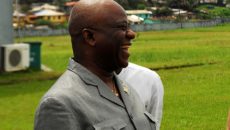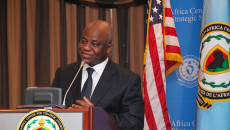Big men rule Africa – and mostly to the detriment of average citizens. The judicial system, which ought to bring some solace to the common man, never ceases to disappoint. As these big men ruin the countries they are entrusted with, they are simultaneously blaming colonialism, neo-colonialism, multilateralism, globalism, the World Trade Organization, the World Bank, the IMF, the E.U., Russia, China, and the list goes on.
They blame all but themselves for the near-perpetual state of destitution of their citizens. Sometimes, one wonders if good governance and ordinary common sense is alien to African leaders.
This scenario of Africa’s big men destroying their own countries was again on display in the West African state of Liberia. Independent since 1847, Liberia is, without doubt, the poorest country in the region, judging by GDP per capita. Liberia is just one typical African country where big men rule is so entrenched, that the executive, the legislature, and the judiciary, all seem to be working in concert with an unwritten code: never hold a big man accountable.
This brings me to the crux of this article – the affirmation of the conviction of Lofa’s Senator-elect Brownie J. Samukai, Jr. He served for 12 years as defense minister under the regime of former president Ellen Johnson Sirleaf. For all these 12 years, Samukai was probably the third-most powerful man in Sirleaf’s government, ranking just behind the president herself and her son, Robert Sirleaf.
Samukai ran Liberia’s Ministry of National Defense as his personal fiefdom, with no accountability whatsoever – never to the constitution nor to the statutory laws of Liberia. Anybody who was anywhere around during the Sirleaf administration knows that Samukai operated the ministry in a sphere somewhere above the laws of Liberia. This comes as no surprise – that’s where the big men of Africa generally operate.
So, like a typical African big man, the standard 10-70 percent cuts in procurement contracts were not enough for Samukai. He had to add the pension benefits of the thousands of our men and women-in-arms (i.e., soldiers of the Armed Forces of Liberia). That’s the standard “eat all” mentality of the big men in Africa.
As defense minister, Samukai and his co-conspirators set up a pension fund for thousands of our servicemen and women and exacted mandatory deductions from their salaries. Now, under generally accepted accounting standards, such an account would qualify as a special fund – subject to special written procedures and policies. But Samukai didn’t need any written policy or procedure to operate this special pension fund; his mere orders were the law and the policy.
Samukai, with an M.Sc. in Applied Economics, ought to have known a thing or two about special funds. But, when the mind is corrupt, a college degree is often of no use. Perhaps his work with the U.N. should have taught him a thing or two about special funds. But again, transparency and accountability are alien concepts to the big men of Africa.
So, Samukai and his bunch of yes-men at the Defense Ministry had a field day with the AFL soldiers’ pension fund. They used the funds for “security operations.” Now anybody with even two of their five senses intact knows that “security operations” in Liberia is the byword for the looting of the public treasury. “Security operations” in Liberia means take as much money as you want from the public treasury, use it in any form and manner as you want – and you never have to worry about giving account to anyone because “security men” don’t have to account for money given to them for “operations.”
By the time Samukai and his bunch of yes-men got through with the AFL soldiers’ pension fund, it was US$1.15 million in the red. They had unilaterally changed the name of the account from “pension fund” to “moral and welfare account,” transferred nearly all the funds to the ministry’s operational accounts, and feasted on the soldiers’ pension money. As heartless as it sounds, that was what Samukai and his bunch of yes-men did! Of course, the soldiers were perennially complaining about these corrupt practices. But Samukai, as I stated earlier, was the third most powerful person in Liberia and definitely one of Sirleaf’s untouchables.
When the Sirleaf regime was up by January of 2018, the incoming big men (i.e, the now ruling Coalition for Democratic Change), the outgoing big men (the Unity Party people), all got together and fashioned out a hush-hush agreement – that the Liberian government would replenish the account that one of their kind depleted. It was a lousy agreement to start with, but if you understand the politics of big men in Africa, you get the drift. Of course, things got complicated when Samukai decided he wanted to be a senator for Lofa. The CDC people interpreted his move as his drawing first blood, and things fell apart in short order. The CDC big men then dusted off Samukai’s files and yanked the agreement. They were determined to have Samukai answer for his criminal acts.
The Liberia government then prosecuted Samukai and two yes-men (Joseph P. Johnson and James Nyumah Dorkor) and the trial court brought down a guilty verdict on three of the five charges – for criminal conspiracy, theft of property, and misuse of public money. A prison sentence and a restitution order followed. Samukai and his partners-in-crime appealed the decision to the Supreme Court.
Now comes the shocker. The Supreme Court affirmed the lower court’s ruling, but only up to a point. When it came to the punishment, the big men at the Supreme Court decided that, although one of their kind had been caught pilfering red-handed, prison, as a matter of fact, was only for common people – for the average joes. So, the Liberian Supreme Court decided to throw one of their kind a lifeline – a watered-down punishment with the clear option to avoid going to jail.
The court gave Samukai six months to pay back the looted money or go to jail. Let me repeat, in case you didn’t get it right the first time. For criminal breach of his fiduciary duty by a top-ranking official, the Liberian Supreme Court ruled that he’s got six months to pay back the money he criminally converted and he will see no jail time. In short, he’s an African big man and he’s simply too big to jail. It must have been lost on our Supreme Court justices that every decision that they make becomes precedent (law). Is this the new law in Liberia now that if one criminally converts another’s property, all such felons have to do is to pay back the money and there will be no prison time. Really? Is this what our Supreme Court is now saying the law is? At this rate, it may take Jesus Christ himself to come down and save Liberia.
Over the past years, Liberians have been used to being disappointed by our court system, but the Samukai ruling takes the cake. How can a criminal breach of fiduciary duty result in no prison time for a senior public official? Where is the disgust and opprobrium by our Supreme Court? Is this ruling a code for Samukai to continue on to his new job as senator of Lofa? I suspect most of us Africans would shrug it off as just another day, but in most parts of the world, such a ruling is simply unthinkable, utterly impossible. Let’s take a peek to see how detestable this ruling compares to others around the globe.
- Chicago, Illinois, USA. Governor Rod Blagojevich attempted to sell President Barack Obama’s vacated senate seat. He was prosecuted for fraud, attempted extortion, and conspiracy to solicit bribes. On June 27, 2011, Blagojevich was found guilty of 17 charges (including wire fraud, attempted extortion, and conspiracy to solicit bribes), and sentenced to 14 years in prison. On February 18, 2020, President Donald Trump commuted Rod Blagojevich’s prison sentence. Blagojevich was released from prison, but only after having served about seven years of his 14-year sentence.
- Seoul, South Korea. Park Geun-hye, former President of South Korea who served from 2013 until 2017 when she was impeached and later convicted for abuse of power, bribery, criminal coercion, and leaking government secrets. Park was sentenced to 20 years in prison and is currently in prison. South Korea’s Supreme Court still handed her a 20-year prison sentence, in addition to a US$16 million fine.
- Dakar, Senegal. Karim Wade, son of former Senegalese President Abdulaye Wade. In Senegal, the junior Wade was so powerful, he was dubbed the minister of the Earth and the Sky – a scenario akin to Robert Sirleaf of Liberia. A year after his father left office, Karim Wade was charged with corruption and illicit enrichment, convicted, and imprisoned on March 23, 2015, He was also fined the equivalent of US$228 million. Wade appealed to the Supreme Court, but the court ruled against him. He spent three years in jail before being pardoned by current President Macky Sall and released from prison on June 24, 2016. He was, however, still required to pay his fine.
I have just mentioned three high-level cases in which criminal breach of fiduciary duties, corruption, bribery, and influence peddling were punished very harshly by the courts – including the Supreme Court of an African country, Senegal. There is no way under this sun that a top-ranked government should be convicted for such charges as criminal conspiracy, theft of property, and misuse of public monies and not serve prison time.
But the Supreme Court of Liberia is now establishing a new law: that some people are just too big to jail. If the option to Samukai to pay back the stolen money and avoid jail time is to leave him a back door to the capitol (to his senate career), it is belated. Under §50.12 of the penal code, Samukai’s Senate career ended even before it could start (thanks to the conviction). The law provides that:
A person, convicted of any of the crimes listed below, or of any attempt or conspiracy to commit such crime or of facilitation or solicitation of such crime, shall forfeit any public office he then holds and may be disqualified from any or a specified public office or category thereof for such period as the court may determine, but no longer than five years following completion of the sentence imposed for such crime:
- Treason (Section 11.1) and the crimes affecting national security defined in Sections 11.2 through 11.9;
- Any felony committed in connection with his employment as a public servant;
- A crime expressly made subject to this section by statute.
Now, let’s break it down in clear terms. What Samukai was convicted of was a felony and it was definitely committed in connection with his employment as a public servant (i.e., as minister of defense). Via the clear meaning of this statute, his public service career is on “ice” for up to five years after serving his sentence or “after restitution” as our Supreme Court would rather have it – since he’s too big to jail.
Liberians have long been used to a two-tier justice system – a softer one for the rich and well-connected (i.e, for the big men) and another for the poor, the harsher one, including mob lynching and other extra-judicial actions. It is not lost on the people of Liberia that big men commit their fair share of crimes that require jail time, but they never set foot in jail, owing to sweetheart deals with the prosecuting agencies or a slap on the wrist by the big men who run judiciary (i.e., the judges and justices). Let’s take another look at two of the most prominent ones who are still a source of consternation in Liberia.
- Abu Kamara – junior minister under the Unity Party government and elected representative under the CDC government. Kamara was caught double-dipping in public accounts. An investigative report by the Liberia Anti-Corruption Commission showed that Kamara consented to receiving US$8,000 and L$200,000 in illegal salaries. Instead of levying formal criminal charges and prosecuting him, the LACC itself (at the time led by corrupt people) colluded with Kamara to evade criminal liability simply having him confess to the crime and to paying back at the rate of US$500 per month. This was a shocking abuse of investigative and prosecutorial discretion, done with the blessing of the very people who are now hounding Samukai.
- Milton Teahjay – a quintessential big man – a minister in every government since ex-president Charles Taylor’s regime. Today, Teahjay is a senator, representing the people of Sinoe. Teahjay was convicted of violating procurement laws and other criminal acts, including criminal conspiracy, criminal facilitation, and misapplication of entrusted property by the 14th Judicial Circuit in River Cess. Instead of serving prison time, he was given 9 months to pay back US$50,000 and avoid going to jail – another big man guilty of crimes, but too big to jail. Is this a country of laws or of men?
Today the Supreme Court of Liberia is saying that in cases of theft of property, criminal conspiracy, and misapplication of entrusted property, all the convicted felon has to do is to pay back the money and all will be fine. But this was not the opinion of the high court when Edwin Korpoi, an average joe, stole 42 bags of cement from the Samaritan Purse International Relief organization in 2012. In the ruling handed down on August 12, 2012, the court not only confirmed the conviction of Korpoi but increased his sentence from 4 months in jail to 6 months in jail – to further express their indignation and opprobrium. This is how the court reacted to the conduct of Korpoi, an average joe, for stealing 42 bags of cement from Samaritan’s Purse International Relief.
Here is what the court said at the time:
We need not emphasize the health hazard of rural inhabitants whose drinking water is taken from creeks. It is therefore disheartening that a fellow Liberian working with this organization and who has an opportunity to ensure better health for his people by providing safe drinking water could be so dishonest as to use up the materials given for such a project, much to the detriment of his fellow citizens…. This court frowns on such behavior and will not condone any of such behavior when brought before it, particularly where there is overwhelming evidence produced as to the dishonesty of the accused, and we are left with no doubt about the commission of the crime by the accused.
Now in 2021, Samukai, a big man, committed even worse crimes than Edwin Korpoi by stealing US$1.15 million as opposed to the paltry 42 bags of cement stolen by Korpoi. In the Samukai case, he stole not from a corporation (as Korpoi did), but from the thousands of underpaid men and women of the AFL, depriving them of the opportunity to benefit from their pension fund. Almost identical crimes save for the magnitude of the theft by Samukai. Only that, this time around, a big man, a former minister, now senator-elect, is in the opinion of our Supreme Court, too big to jail. Instead of showing similar indignation and opprobrium to Samukai as was shown to Korpoi, our Supreme Court is so keen to have Samukai evade jail by giving him an option to restitute the money and not have to go to jail – double standards in the most despicable manner. This ruling runs contrary to the constitution, which provides that “All persons are equal before the law and are therefore entitled to the equal protection of the law.” What was good for Edwin Korpoi, a common man, must also be good for Samukai, a big man. So, why is the Liberian Supreme Court being arbitrary and discriminatory when it comes to punishment for an almost identical offense? How is the Samukai case different from the Edwin Korpoi case to justify a suspension of prison term? Why are our justices turning a blind eye to the constitution? How can Edwin Korpoi go to jail for six months for failing to account for 42 bags of cement, but Samukai is spared a prison sentence after failing to account for US$1.15 million?
We can’t just continue to accept arbitrary rulings and detrimental precedents forever. We the citizens have to draw the line somewhere. Our justices must adhere to constitutional principles in their interpretation of the law or be held to account. The wide discretion in punishing for corruption-related criminal offenses means that our legislature must also rewrite our laws on corruption, bribery, breach of trust, abuse of office, and other such related offenses.
The creation of an economic crimes court is not enough. Liberia clearly needs an all-encompassing law on corruption, covering all aspects of the crime. Such law must spell out in clear terms what the minimum and maximum sentences for corruption should be. The legislature has to remove the discretion that judges exercise when it comes to sentencing. From this Samukai ruling, it appears that judges, even at the Supreme Court level, are not prepared to deliver impartial justice. The big-man syndrome plaguing much of Africa is seriously corroding their dispensation of justice. This has to change! This new all-encompassing and comprehensive set of laws on corruption is very necessary now to prevent and preclude the kind of arbitrariness seen in the Samukai ruling and others preceding it (including the Teahjay and Abu Kamara cases). We can make the changes now or we can continue to continue to lend credence to others when they call our countries banana republic or fantastically corrupt.
Featured photo by Zeze Ballah



